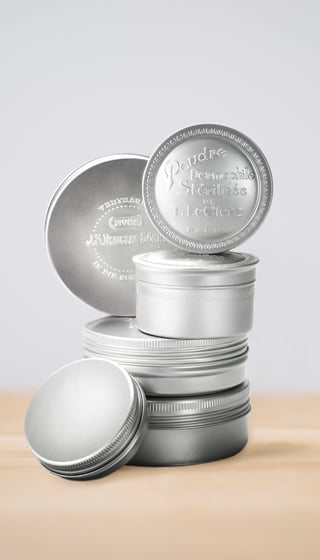Suppliers are the source of raw materials that manufacturers of cosmetic packaging purchase. The terms "suppliers" and "vendors" are often used interchangeably. Eventually vendors may become long term partners if the relationship helps both parties. It's crucial to choose the right supplier if a company is to grow and exceed expectations. Here are ways to evaluate manufacturers, distributors (aka wholesalers), craftspeople and import sources.
Understanding Supplier Economics
Before a cosmetic packaging firm approaches suppliers to evaluate, it's important to understand the needs and financial impact of each vendor. Shipping freight costs, for example, can add up depending on the retailer's location. Wholesalers buy in bulk from multiple manufacturers and must store these materials in warehouses, resulting in higher prices than what individual manufacturers charge. In some cases, these distributors only accept large orders so that they can get the best freight shipping deals.
Exclusive distributors, known as independent craftspeople, typically sell items through trade shows or regional representatives. It's common for retailers to buy foreign items from domestic importers that offer wholesale prices.
Qualities of a Worthy Supplier
- price
- reliability
- stability
- location
- flexibility
- competency
Many companies are fixated on price when they hunt for suppliers, which certainly is a primary concern. The next most important factor to consider should be reliability. Some suppliers, for example, stop taking calls when their buyers ask for discounts too often. That's understandable since they're in the cosmetic packaging business to make money as well. The reason reliability matters is to ensure the right number of items are shipped on time in good condition.
Large suppliers sometimes have the best resources for backup systems in case something goes wrong. Smaller firms should not be ignored, however, since they can help split orders, which provides an alternative source in the event the primary vendor runs low on supplies.
The reason stability is crucial is so that it doesn't come as a shock if the supplier one day must close its doors due to declining business. To minimize this risk, it helps to work with companies that have been well established for many years and can provide positive annual forecasts. A company full of senior executives with excellent reputations is a good indicator of a stable enterprise. The closer the supplier is to the retailer, the better, since shipping costs will be lower and deliveries will arrive quicker.
It's also easier to build relationships with companies closer to home, opening the door for more ordering flexibility. Competency is also an essential quality, if it means the firm stays ahead of the curve on advanced products and services and employs well trained professionals.
The Qualification Process
 Launching a supplier qualification screening analysis is an effective way to narrow down the list of candidates to the best vendors. Making sure the vendor is willing to be responsible for meeting deadlines without damaged goods is crucial. Investigating the company's history and reputation can be accomplished through reference checks by contacting customers. Find out how well the vendor lives up to contract terms and check supplier ratings using a resource like Dunn and Bradstreet to analyze the firm's financial status. Furthermore, scalability is another important factor to learn if they are able to increase production in a shorter time frame.
Launching a supplier qualification screening analysis is an effective way to narrow down the list of candidates to the best vendors. Making sure the vendor is willing to be responsible for meeting deadlines without damaged goods is crucial. Investigating the company's history and reputation can be accomplished through reference checks by contacting customers. Find out how well the vendor lives up to contract terms and check supplier ratings using a resource like Dunn and Bradstreet to analyze the firm's financial status. Furthermore, scalability is another important factor to learn if they are able to increase production in a shorter time frame.
Improving Supplier Relationships
Once a vendor relationship is established, it may not always be necessary to look for alternatives if difficulties arise. Sometimes communicating cosmetic goals is all it requires to encourage a supplier to take extra steps in building a better win-win relationship. Asking for discounts for higher volume orders can benefit both parties.
When service becomes questionable and fails to meet agreed standards, discussing the situation with higher ranking officials may resolve the issue. It saves time and money to stay with the same supplier as long as they are able to maintain quality service.
When To Change Vendors
There are usually more advantages to keeping a short list of suppliers rather than an extensive roster. A shorter list allows for closer relationships with each vendor, which helps make operations and expectations consistent. Replacing vendors should only be attempted as a last resort. Here are appropriate reasons for launching a search for new replacements:
- consistently late or inaccurate shipments or issues with quality
- pricing becoming too out of reach without flexible options
- lack of transparency or poor communication concerns
Conclusion
A cosmetic packaging firm needs to work with suppliers that can deliver goods quickly, efficiently and reliably. The key is to evaluate each vendor based on their abilities to offer high quality at the best prices compared with competitors. Established companies that employ helpful experts within a reasonable proximity of the retailer make strong suppliers.
Disclaimer: The postings in this blog section do not necessarily represent Desjardin's positions, strategies or opinions.
References and Further Reading
- More posts on Cosmetic Packaging, by Alex Cosper and Dawn M. Turner
- Is It a Cosmetic, a Drug, or Both? (2016), by the U.S. Food and Drug Administration
- Regulation (EC) No 1223/2009 on Cosmetic Products (2009), The European Parliament the the European Council
- ISO 22715:2006: Cosmetics -- Packaging and labelling (2006), International Organization for Standardization






